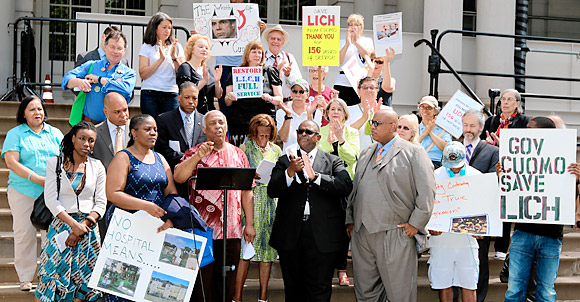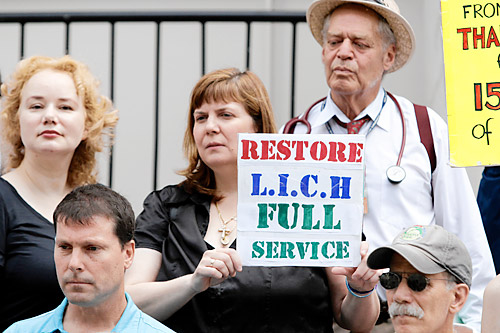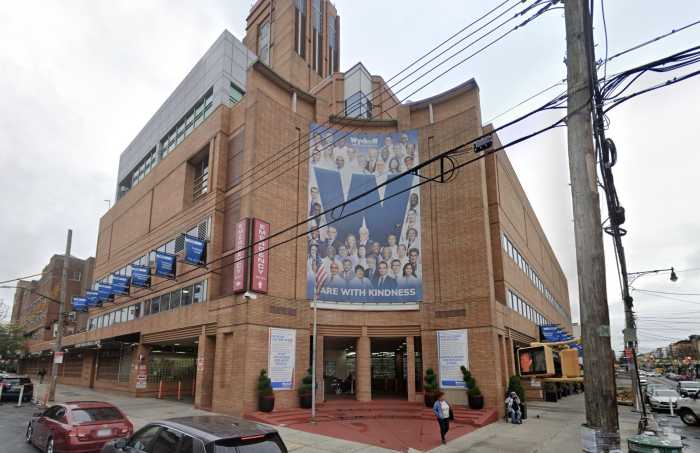The deal to sell the Long Island College Hospital campus is almost done, but accusations of racism are dogging the final steps of the process.
The State University of New York signed a contract on Tuesday with the real estate developer Fortis Property Group to sell the complex that formerly housed Long Island College Hospital for $240 million. Activist litigation to save the hospital has fallen dormant, but previously silent pols and activists are now wading into the fray, claiming the hospital closure and the state’s torpedoing of talks with two minority developers amount to a racist affront to the minority residents of Cobble Hill and the surrounding communities. One African-American firebrand and longtime political figure said the closure of the hospital at the hands of the Gov.-Cuomo-controlled university system calls for drastic measures.
“I’m on my way to Albany, and when I get there I’m going to make a citizen’s arrest of the governor,” said former Councilman Charles Barron, at a press conference on the steps of City Hall on Friday.
No reports suggest that Barron tried to make good on his claimed plan, but nevertheless, he was steamed at the state’s executive.
“He is violating the human rights of our people,” Barron said. “We don’t want a medical facility — we want a full-service hospital.”
The sale still needs to be approved by state Comptroller Thomas DiNapoli, and now members of the state Assembly’s Black, Puerto Rican, Hispanic, and Asian Caucus, along with the National Association for the Advancement of Colored People, are calling on the white DiNapoli to reject the deal.
The coalition is also demanding the attorney general open an investigation into why two racial-minority-owned development companies — Peebles Corporation and Brooklyn Health Partners — were passed over despite scoring higher than Jewish-owned Fortis in a process created by a court settlement. The settlement ended the lawsuit brought by community groups seeking to keep the hospital a hospital.
“We ask for a full investigation as to why these negotiations were conducted in a manner that is both not consistent with the [request for proposals] process and also contravenes the state’s diversity objectives,” wrote the caucus chairman, Assemblyman Karim Camara (D–Crown Heights), in a letter to the state university’s board of trustees.
In a letter response to Camara, university chairman H. Carl McCall, himself a black man and political ally of Peebles Corporation’s black executive Don Peebles defended the board’s decision to scuttle talks with the firms, saying negotiations with each had reached dead ends.
“If we reach an impasse over critical issues such as provision of health care or the ability to fund the transaction or meet requirements of the RFP, we must move on to the next proposer as was directed by the court,” the letter says. “We reached those immovable obstructions with both of the top two proposers.”
McCall also included the letters sent to the respective developers, outlining the state’s reasons for rejecting their proposals.
The state said it killed the Brooklyn Health Partners plan when it could not secure adequate funding, though the firm contends the state sabotaged negotiations and never showed real grounds.
The Peebles deal fell through because it asked to conduct environmental evaluations of the site prior to the sale and requested that the state split the cost of environmental remediation, the state said. It also asked that its medical partner North Shore–LIJ be allowed to operate the emergency department under the state’s license for six months or longer, which the state says it didn’t like.
Barron claimed Peebles should have been given a fairer shot, pointing out that negotiations ended before the prescribed 30-day talk-time expired.
“It’s racist to jump over qualified corporations,” he said. “This is not affirmative action. This is a qualified project corporation ready to do the job.”
Activists contending that the hospital’s closure had a racist outcome point to Red Hook, which Long Island College Hospital served and which is 83 percent non-white, according to the 2010 U.S. Census.
“Red Hook has a per-capita shortage of health services,” said Jeff Strabone, a Cobble Hill Association board member, at the rally. “If you close Red Hook’s hospital you exacerbate that racist health inequity.”
The latest redevelopment arrangement has the university continuing to operate the emergency room at the site until Fortis’s health partner, New York University Langone Medical Center, takes control. The deal will enable the state to wash its hands of the hobbled Cobble Hill emergency facility without a complete stoppage of services, a state spokesman said.
“We look forward to completing the sale of the LICH complex and this is an important step forward as all parties work to ensure SUNY can responsibly exit the property while vital healthcare services will continue to be available to the Brooklyn community,” said David Doyle.
























